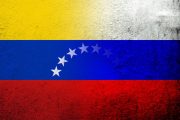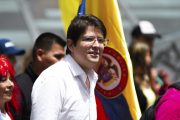Minutes after Marxist Nicolás Maduro inaugurated himself for a second Term as Venezuela’s president last Thursday a majority of the 35-member Organization of American States (OAS) voted not to recognize its legitimacy. This followed disclaimers from 60 countries around the world that his reelection last May was, in the words of President Trump’s National Security Advisor John Bolton, “not free, fair or credible.”
His phony inauguration was preceded two days earlier by the announcement of additional sanctions on more of Maduro’s top officials by the U.S. State Department for allegedly stealing more than $2 billion by gaming the country’s currency controls and for bribery, including the head of Maduro’s packed Supreme Court who swore him in to his new term.
Two days after Maduro’s inauguration, U.S. Secretary of State Mike Pompeo declared that “The Maduro regime is illegitimate and the United States will work diligently to restore a real democracy to that country,” adding that “We are very hopeful we can be a force for good to allow the region to come together to deliver that.”
Pompeo was no doubt referring obliquely to a new group formed for the primary purpose of replacing Maduro: Prosur. It would first of all replace the Marxist Unasur (Union of South American Nations) that Maduro’s predecessor Hugo Chávez set up 10 years ago, and then move in coordination with a number of those South American nations to replace Maduro. Colombian President Ivan Duque made that clear:
We’ve been advancing toward the end of Unasur and the creation of Prosur: a South American platform for the coordination of public policies, the defense of democracy, independent institutions, and market economies.
It is very important that (Unasur), which has been a supporter of the dictatorship of Venezuela, be shut down.
Maduro’s opposition is already moving ahead with its plan. As The New American reported on Monday, Brazil’s government issued a statement on Saturday, saying that it recognized Juan Guaidó, the head of the country’s legitimate National Assembly, as the country’s rightful president. He would serve as an interim president until new elections could be held.
One final sanction remains to be implemented. As The New American noted last week, “as long as [Maduro] can continue to receive life support from China, Russia, and the U.S. oil industry, he could safely and successfully run for reelection a third time in 2025.” The Wall Street Journal pointed out that shipments of oil from his state-controlled oil company PdVSA to U.S. Gulf Coast refineries is the only thing keeping him alive: “Despite years of anti-U.S. rhetoric, Venezuela still ships about half of its oil production to the U.S.… [Those] shipments to the U.S. are virtually the only source of cash for Caracas since much of the rest of its crude [exports] is used to repay debts with its strategic allies like China, Cuba and Russia.”
And now, finally, Washington is considering shutting down that final financial lifeline that is keeping Maduro in power. An unnamed White House official told the Journal that “until now, we have been going around the edges. Now, it’s a new dynamic: we are no longer going to be tinkering around the edges.”
That half of PdVSA’s production to U.S. refineries amounts to about 500,000 barrels of crude every day. At $50 a barrel, that “final financial lifeline” that Maduro is depending upon is generating $25 million a day, or about $750 million a month. If Washington does indeed move ahead to cut off Maduro’s remaining cash flow, then the remainder of Maduro’s presidency won’t be measured in years but in months.
When he departs from the present scene, the memory of Maduro’s madness will fade away like a bad dream. And then the people of Venezuela can start breathing once again, taking advantage of the country’s enormous petroleum resources that have been ravaged by Maduro’s socialist regime. Under a new president who cherishes the country’s constitution, Venezuela would be able to celebrate its newly restored freedom and regain its stature as one of South America’s premier economic powerhouses.
Photo: AP Images
An Ivy League graduate and former investment advisor, Bob is a regular contributor to The New American magazine and blogs frequently at LightFromTheRight.com, primarily on economics and politics. He can be reached at [email protected].
Related articles:
Venezuela’s Marxist President Maduro Inaugurated for Second Term
Venezuela Legislature Wants Maduro Out; Brazil Recognizes Guaido as President




